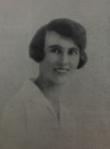Edith Mary England was born in 1899 in Townsville, North Queensland, the daughter of John England. When she was six the family moved to a farm near Boonah, one of the Brisbane "Rim" towns. She was educated in Sydney and at Ipswich Grammar. As a child she won children's paper competitions for fairy stories in London and Sydney, and edited a small school magazine in Sydney.
In her teens she gained an ATCL and Art of Teaching certificate, and later a degree in music, which she taught for a time, as well as working as a part-time reporter and typist. In 1922 England married Schomberg Montagu Bertie, and had two daughters, Caroline (1923) and Patricia (1926). Bertie died in 1937, and in 1938 England left Boonah. She apparently returned to the bush when she remarried, to Henry August Anders (1942).
England had published a number of poems in the Brisbane Daily Mail by the age of 18, and her first collection, The Happy Monarch and Other Verses, appeared in 1927. Her work also appeared in the Sydney Bulletin, the Australian Woman's Mirror, and The Meanjin Papers, among others. Queensland Days, appeared in 1944, and was followed by Where the Old Road Ran: and other poems, (1970).
England produced a number of short stories, some collected in Tornado and other stories (1945). Her novels Laughing Devlin and Hermit's Hill were serialized in The Queenslander in 1928-1929 and 1931 respectively, but The Sealed Temple (1933) is usually taken as her first full-length prose work. It resembles Laughing Devlin in its building of adventure round a romantic triangle, but where Laughing Devlin is set wholly in Queensland, the second half of The Sealed Temple takes place in Guatemala. Both novels, like Hermit's Hill have strong depictions of Australian bush life, landscapes, evidently modeled on the Boonah area, and natural events, such as the flood in Hermit's Hill. But Hermit's Hill, with its more complicated structure, is also strongly sympathetic to women, turning on the story of two separated sisters and their mother, and vividly presenting the pain of a stolen child and custody battles.
The themes of unhappy marriage and custody battles reappear in House of Bondage, England's last novel (1953), but that closes with a female writer leaving both unhappy marriage and a possible replacement to follow her craft. Where the Turtles Dance (1950) is remarked by Vivienne Muller for its construction of a relationship between the female protagonist and the landscape of the farm she inherit. A similar relationship appears in House of Bondage. The romantic relationships in the former are less successful than the women's relationships in Hermit's Hill. Road Going North (1952), written in collaboration with Ray Albion, uses a male protagonist's point of view for the story of a wealthy young Sydney layabout who becomes 'a man' on a station in north-west Queensland. Once again the locale and life and events are vividly realized but the characters of the lovers are less convincing.
Though experimenting with free verse in the 1950s and '60s, England was a prolific poet in traditional verse forms, taking her subjects from bush or country life, animals both wild and domestic, and emotional landscapes. Her traditional forms complemented a lifelong interest in history and Latin America, both of which supplied many subjects for her short fiction and poems. She died in 1981.
 3348038200386048170.jpg
3348038200386048170.jpg
